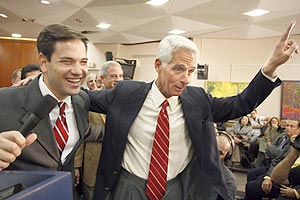By Jennifer
Liberto and Joni James TALLAHASSEE - Florida lawmakers appear ready to deliver on one of Gov. Charlie Crist's campaign promises to punish insurers who have retreated from the state's property market while still writing other insurance in the Sunshine State, such as auto. In a surprise voice vote Wednesday, the Florida Senate agreed to force Florida insurance companies who write property insurance in other states to offer it here if they want to continue writing any insurance in this state. The House has a similar proposal.
"I'm very pleased," said Crist when he heard about the Senate's changed position. "It's not important because it's something I campaigned on. It's important because I believe it will help the people of Florida." The prohibition on insurers is expected to have little effect on individual policyholders' rates, and Sen. Bill Posey, R-Rockledge, who heads the Senate's insurance committee, said he believed it could create a new crisis in the automobile market. "That amendment, all by itself, has the power to in the long term destroy Florida's insurance market," said William Stander, assistant vice president for Property Casualty Insurers Association of America. "They think it will force companies to write all types of insurance. I think the consequences are the opposite, that it will force companies to re-evaluate their position in the Florida marketplace whether or not they do any business here." Other agreements between the two chambers include: a rollback on rates to 2006 levels for Citizens Property Insurance Corp. customers and more options for policyholders to reduce their premiums if they agree to assume more risk. The Legislature also agrees that they want to require building codes in Florida's Panhandle to match stronger codes in the rest of the state. "We have extraordinary agreement on almost all the major points of legislation," said House Speaker Marco Rubio, a Miami Republican. Yet, the biggest difference in the two plans remains on the one issue that could deliver the biggest rate relief: offering insurers cheaper reinsurance and forcing them to pass on savings to policyholders. Reinsurance is insurance for insurers. In Florida, the state already provides cheap reinsurance for statewide damages above $6-billion and less than $22-billion. The chambers moved closer together on the reinsurance issue Wednesday, when the House agreed with the Senate that any additional cheap reinsurance offered by the state should be for statewide hurricane damage above $22-billion. Both chambers contemplate covering 90 percent of damages above that $22-billion threshold - the current limit of the state's Hurricane Catastrophe Fund. But they differ on how much more coverage to offer, whether to charge for it and whether it would cover all insurers. The House wants to offer up to $12-billion more in voluntary reinsurance coverage to private insurers, but charge for it. While the Senate has proposed a universal plan covering all insurers in which the state assumes an additional $23-billion in risk free of charge. House leaders released data Wednesday suggesting their plan could save homeowners as much as 65 percent on their windstorm premium. But that's only a best case scenario, with every insurer participating. State Farm Florida, the state's largest private insurer with 1-million policies, said it might not participate because the reinsurance might still cost more than what it buys from its parent company. And Senate leaders, who on Tuesday predicted their plan could save 35 percent on windstorm policies, also questioned the House numbers. "One of our sets of numbers is wrong," said Sen. Steve Geller, D-Hallandale Beach, "and I hope it's ours. But how can theirs save more money when they're charging for it?" Times staff writers Alex Leary and Steve Bousquet contributed to this article. What's on the table Everybody seems to like:
House-only provisions:
Senate-only provisions - Having the state self-insure 90 percent of losses between $22-billion and $40-billion per hurricane season, sharply reducing insurers' need to buy costly reinsurance, ultimately lowering policyholders' premiums.
Governor's plan
|
